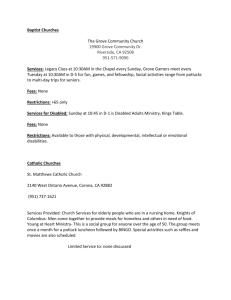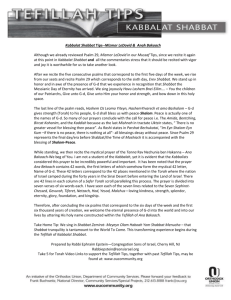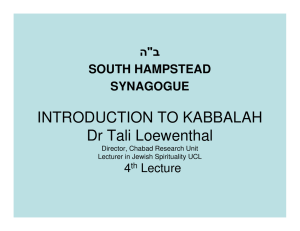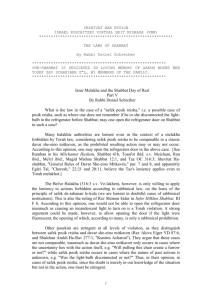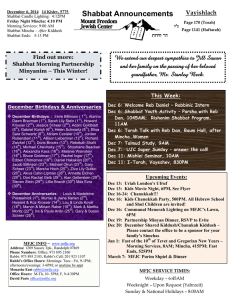à ð £ §
advertisement
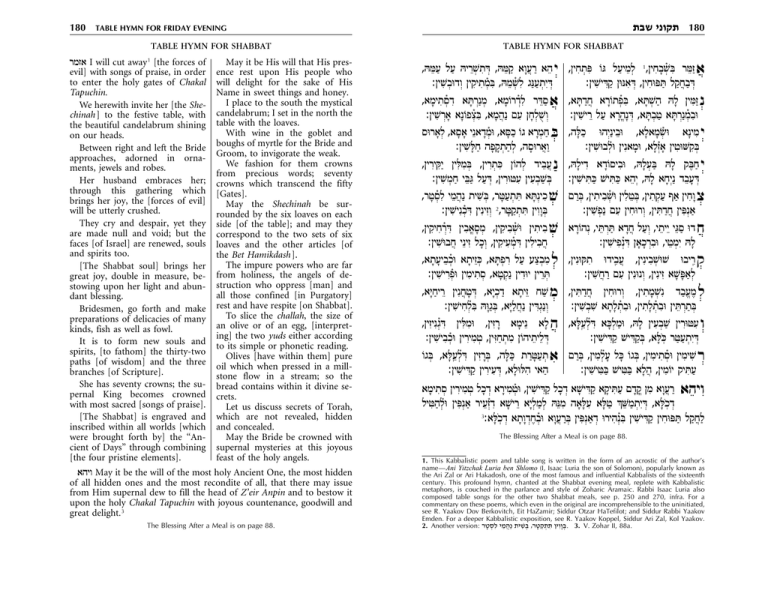
180 zay ipewz TABLE HYMN FOR FRIDAY EVENING TABLE HYMN FOR SHABBAT øîæà I will cut away 1 [the forces of evil] with songs of praise, in order to enter the holy gates of Chakal Tapuchin. We herewith invite her [the Shechinah ] to the festive table, with the beautiful candelabrum shining on our heads. Between right and left the Bride approaches, adorned in ornaments, jewels and robes. Her husband embraces her; through this gathering which brings her joy, the [forces of evil] will be utterly crushed. They cry and despair, yet they are made null and void; but the faces [of Israel] are renewed, souls and spirits too. [The Shabbat soul] brings her great joy, double in measure, bestowing upon her light and abundant blessing. Bridesmen, go forth and make preparations of delicacies of many kinds, fish as well as fowl. It is to form new souls and spirits, [to fathom] the thirty-two paths [of wisdom] and the three branches [of Scripture]. She has seventy crowns; the supernal King becomes crowned with most sacred [songs of praise]. [The Shabbat] is engraved and inscribed within all worlds [which were brought forth by] the “Ancient of Days” through combining [the four pristine elements]. May it be His will that His presence rest upon His people who will delight for the sake of His Name in sweet things and honey. I place to the south the mystical candelabrum; I set in the north the table with the loaves. With wine in the goblet and boughs of myrtle for the Bride and Groom, to invigorate the weak. We fashion for them crowns from precious words; seventy crowns which transcend the fifty [Gates]. May the Shechinah be surrounded by the six loaves on each side [of the table]; and may they correspond to the two sets of six loaves and the other articles [of the Bet Hamikdash ]. The impure powers who are far from holiness, the angels of destruction who oppress [man] and all those confined [in Purgatory] rest and have respite [on Shabbat]. To slice the challah, the size of an olive or of an egg, [interpreting] the two yuds either according to its simple or phonetic reading. Olives [have within them] pure oil which when pressed in a millstone flow in a stream; so the bread contains within it divine secrets. Let us discuss secrets of Torah, which are not revealed, hidden and concealed. May the Bride be crowned with supernal mysteries at this joyous feast of the holy angels. àäéå May it be the will of the most holy Ancient One, the most hidden of all hidden ones and the most recondite of all, that there may issue from Him supernal dew to fill the head of Z’eir Anpin and to bestow it upon the holy Chakal Tapuchin with joyous countenance, goodwill and great delight. 3 The Blessing After a Meal is on page 88. 180 TABLE HYMN FOR SHABBAT ,dnr ¥ © ìr© déøLúc ¥ § ¦ § ,dn÷ ¥ © àårø ¨ £ © àä¥ é§ :ïéLáeãå ¦ § § ïé÷éúîa ¦ ¦ û§ ¦ ,dîLì ¥ û§ ¦ âprúéc ©© § ¦ § ,àîéúñã ¨ ¦ û§ ¦ àzøðî ¨ § © § ,àîBøãì ¨ û§ ¦ øcñ ¥© à £ :ïéLøà ¦ § ¨ àðBôöa ¨ û§ ¦ ,àîäð ¨ £ © ír¦ ïçìLå ¨§ª § ñeøàì ¨ § ,àñà ¨ ¨ éðàãîe ¥ ¨ û§ ,àqë ¨ © Bâ àøîç ¨ § © a§ :ïéLlç ¦ ¨ © äô÷úäì ¨ ¨ § © § ,äñeøàå ¨ £© ,ïéøéwé ¦ ¦ © ïélîa ¦ ¦ § ,ïéøúk ¦ § ¦ ïBäì§ ãéár ¥ £ ð© :ïéLîç ¦ § © éab ¥ © ìrc © § ,ïéøehr ¦ ¦ ïéráLa ¦§© § ,øèñì ¨ û§ ¦ éîäð ¥ £ © úéLa ¦ § ,øhrúz ¨ © § ¦ àzðéë ¨§ ¦ L § 2 :ïéLéðëc ¦ ¦ û§ ¦ ïéðéæå ¦ ¦ § ,øh÷úz ¨ © § ¦ ïéååa ¦¨ § ,ïé÷éçøc ¦ ¦ û§ ¦ ïéáàñî ¦ ¢ ¨ § ,ïé÷éáLe ¦ ¦ û§ ïéúéá ¦ ¦L § :ïéLeáç ¦ £ éðéæ ¥ ¦ ìëå ¨ § ,ïé÷érîc ¦ ¦ û§ ¦ ïéìéáç ¦ ¦£ ,àúréáëe ¨ ¨ ¥ û§ àúéæk ¨ ¥ § ,àzôø ¨ § ¦ ìr© òöáî © § ¦ ì§ :ïéLéøôe ¦ ¦ û§ ïéîéúñ ¦ ¦ § ,àè÷ð ¨ § © ïéãeé ¦ ïéøz ¥§ ,àiçéø ¨ © ¥ ïéðçèc ¦ £ ¨ § ,àéëã ¨ § © àúéæ ¨ ¥ çL© î§ :ïéLéçìa ¦ ¦ §û ¦ deâa ¨© § ,àiìçð ¨ © £ © ïécâðå ¦§©§ ,ïéæéðâc ¦ ¦ û§ ¦ ïélîe ¦ ¦ ,ïéæø ¦ ¨ àîéð ¨ ¥ àì¨ ä £ :ïéLéáëe ¦ ¦ û§ ïéøéîè ¦ ¦ § ,ïéfçúî ¦ © § ¦ ïBäéúéìc ¥ ¥ § Bâa§ ,àlrìc ¨ «¥ §û ¦ ïéæøa ¦ ¨ § ,älk ¨ © úøhrú © ¨ © § ঠ:ïéLéc÷ ¦ ¦ © ïéøérc ¦ ¦ § ,àìelä ¨ ¦ éàä© ,ïéçút ¦ § ¦ Bb ìréîì © ¥ § 1 ,ïéçáLa ¦ ¨ û§ ¦ ønæ ¥©à £ :ïéLéc÷ ¦ ¦ © ïepàc ¦ § ,ïéçetz ¦ © ì÷çác ©£© § ,àzãç ¨ © £ àøBúôa ¨ û§ ¦ ,àzLä ¨ § © dì¨ ïénæ ¦ © ð§ :ïéLéø ¦ ¥ ìr© àøäðc ¨ ¢ ¨ § ,àzáè ¨ § © àzøðîáe ¨ § © û§ ¦ ,älë ¨ © eäéðéáe §© ¥ ,àìàîNe ¨ ¨ û§ àðéî ¨ ¦ é§ :ïéLeáìe ¦ §û ïéðàîe ¦ ¨ ,àìæà ¨ û§ ¨ ïéèeM÷a ¦ ¦§ ,dìéã ¨ ¦ àãBñéáe ¨ ¦ ,dìra ¨ § © dì¨ ÷aç ¤ © é§ :ïéLézk ¦ ¦ © Lézk ¦ © àäé ¥ § ,dì¨ àçéð ¨ § © ãárc ¥¨ § íøa © § ,ïéúéáLe ¦ ¦ û§ ïéìèa ¦ ¥ § ,ïéú÷r ¦ § © óà© ïéçå ¦ ¨ ö§ :ïéLôð ¦ § © ír¦ ïéçeøå ¦ § ,ïézãç ¦ © £ ïétðà ¦§© àøBäð ¨ § ,ézøz ¥ § © àãç ¨ £ ìrå © § ,éúéé ¥ ¥ ébñ ¥ © eã ç £ :ïéLéôðc ¦ ¦ û§ ¦ ïàëøáe ¨ ¨ § ¦ ,éèîé ¥ § ¦ dì̈ ,ïéðewú ¦ ¦ eãéár «¦ £ ,ïéðéáLeL ¦ ¦§ eáéø«¦ ÷§ :ïéLçø ¦ £ © ír¦ ïéðeðå ¦ § ,ïéðéæ ¦ ¦ àLtàì ¨ ¨©§ ,ïézãç ¦ © £ ïéçeøå ¦ § ,ïéúîLð ¦ ¨ § ¦ ãárî © ¡ ¤ ì§ :ïéLáL ¦ § ¦ àúìúáe ¨ ¨ û§ ¦ ,ïéúìúáe ¦ ¨ û§ ¦ ïézøúa ¥ §© § ,àlrìc ¨ «¥ §û ¦ àkìîe ¨ § © ,dì¨ ïéráL ¦ § © ïéøehr ¦ ¦ å§ :ïéLéc÷ ¦ ¦ © Léc÷a ¦ © § ,àlk ¨ Ÿ « øhrúéc ©© §¦§ íøa © § ,ïéîìr ¦ §û ¨ ìk¨ Bâa§ ,ïéîéúñe ¦ ¦ û§ ïéîéL ¦ ¦ ø§ :ïéLéha ¦ ¦ © Léha ¦ © àìä ¨ £ ,ïéîBé ¦ ÷ézr ¦© àîéúñ ¨ ¦ § ïéøéîè ¦ ¦ § ìëã ¨ § àøéîèe ¨ ¦ û§ ,ïéLéc÷ ¦ ¦ © ìëã ¨ § àLéc÷ ¨ ¦ © à÷ézr ¨ ¦ © íã÷ ¨ ¢ ïî¦ àårø ¨ £ © àäéå ¥ ¦ ìéhäìe ¦ © §û ïétðà ¦ § © øéræã ¥ û§ ¦ àLéø ¨ ¥ àéìîì ¨ § © § dpî ¥ ¦ äàlr ¨ ¨ ¦ àlè ¨ © CMîúéc ¥ © § ¦ § ,àlëã ¨Ÿ« § 3 :àlëã ¨ Ÿ « § àúåãçáe ¨ ¨ § ¤ û§ àårøa ¨ £ © § ïétðàã ¦ § © § eøéäða ¦ û§ ¦ ïéLéc÷ ¦ ¦ © ïéçetz ¦ © ì÷çì ©£© The Blessing After a Meal is on page 88. 1. This Kabbalistic poem and table song is written in the form of an acrostic of the author’s name— Ani Yitzchak Luria ben Shlomo (I, Isaac Luria the son of Solomon), popularly known as the Ari Zal or Ari Hakadosh, one of the most famous and influential Kabbalists of the sixteenth century. This profound hymn, chanted at the Shabbat evening meal, replete with Kabbalistic metaphors, is couched in the parlance and style of Zoharic Aramaic. Rabbi Isaac Luria also composed table songs for the other two Shabbat meals, see p. 250 and 270, infra. For a commentary on these poems, which even in the original are incomprehensible to the uninitiated, see R. Yaakov Dov Berkovitch, Eit HaZamir; Siddur Otzar HaTefilot; and Siddur Rabbi Yaakov Emden. For a deeper Kabbalistic exposition, see R. Yaakov Koppel, Siddur Ari Zal, Kol Yaakov. ¨ § ¦ indp ¥ £ © ziWA ¦ § ,xHwzY ¨ © § ¦ oieeA ¦ ¨ § . 3. V. Zohar II, 88a. 2. Another version: xhql


